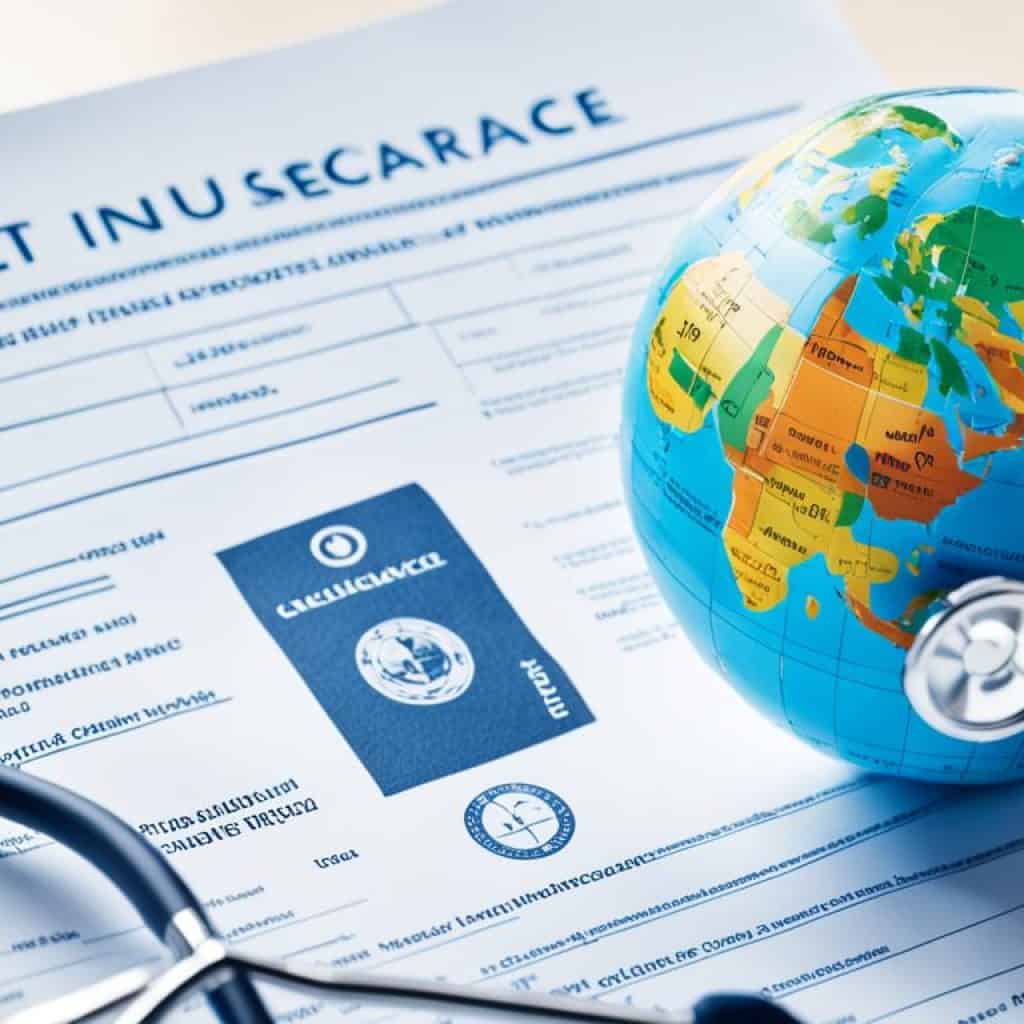Planning to move abroad? Securing your health and the health of your dependents is crucial. But here’s a question to ponder: Can you navigate the complexities of healthcare systems in different countries and ensure your well-being as an expat?
Whether you’re an adventurous soul exploring new horizons or a professional seeking global opportunities, understanding the healthcare landscape in your new home is essential. From healthcare facilities to insurance coverage, this guide provides essential tips and insights to keep you healthy and thriving as an expat.
Key Takeaways:
- Research the healthcare system and standards of your chosen destination before moving abroad.
- Take proactive measures to stay healthy, such as getting vaccinations and preparing for climate changes.
- Ensure you have appropriate health insurance coverage tailored to your expat needs.
- Familiarize yourself with emergency services and administrative steps upon arrival in your new country.
- Adjusting to a new culture and climate requires time and self-care for a smooth transition.
Health Preparation: Before You Become an Expat
Prior to embarking on your journey as an expat, it’s essential to take proactive steps to ensure your health and well-being in your chosen destination. Understanding the healthcare system, facilities, and services available will empower you to make informed decisions and prepare for any healthcare needs that may arise during your time abroad.
Researching the Healthcare System
One of the first steps you should take in preparing for your move abroad is to thoroughly research the healthcare system of your destination country. Familiarize yourself with the local healthcare standards, emergency services, and availability of healthcare facilities. By gaining insights into the quality of medical services and waiting times, you’ll be better equipped to manage your healthcare needs effectively.
Considerations for Expats
As an expat, it’s important to consider specific factors that may affect your access to healthcare. Evaluate the availability of healthcare services for expats and determine if the quality meets your expectations. Additionally, ensure that you have adequate health insurance coverage to provide financial protection and access to the necessary medical services.
Remember, moving abroad means adjusting to a new healthcare system. By doing your homework and being well-prepared, you can navigate the healthcare facilities and services with confidence.
Now, let’s take a closer look at the essential aspects to consider when researching healthcare facilities and preparing for your move abroad.
Healthcare Facilities and Services
When researching healthcare facilities, take into account the availability and proximity of hospitals, clinics, and specialized medical centers. Look for facilities that cater to the needs of expats and offer services in English or your preferred language. Consider the following factors:
| Factors to Consider | Description |
|---|---|
| Quality of Medical Services | Evaluate the reputation and accreditation of healthcare providers to ensure high-quality care. |
| Waiting Times | Understand the typical waiting times for non-emergency consultations and procedures. |
| Availability of Specialized Services | Check if the healthcare facilities provide the necessary specialized services you may require. |
| Language Services | Consider if the healthcare centers offer translation services to assist with language barriers. |
By carefully considering these factors, you can make well-informed decisions regarding your healthcare options abroad and ensure a smooth transition to the new healthcare system.
Staying Healthy While You're Abroad
Moving to a new country can introduce certain health risks. It’s crucial to prioritize your health and take proactive measures to stay healthy during your time as an expat. Researching healthcare facilities in your destination is a key first step towards ensuring reliable healthcare access. Understanding any specific health hazards in your new environment can help you take necessary precautions and minimize potential risks.
An important aspect of staying healthy as an expat is ensuring that you are up to date with the necessary vaccinations. Different countries may have unique vaccination requirements, so it’s vital to consult with a healthcare professional or visit a travel clinic to get the appropriate immunizations before your departure.
When relocating to countries with different climates, it’s crucial to prepare for potential respiratory problems. Changes in temperature and air quality can impact your respiratory system. Taking preventive measures such as using air purifiers, wearing masks in polluted areas, and maintaining good hygiene practices can help protect your respiratory health in your new surroundings.
Researching Healthcare Facilities
Researching healthcare facilities in your destination country is essential for understanding the available medical services and standards. Look for accredited hospitals and clinics that meet international healthcare standards. Consider the proximity of healthcare facilities to your residence or workplace and whether they offer services in your preferred language.
You may also need to adapt to a new healthcare system and understand how the processes work in your host country. Familiarize yourself with the local emergency medical services and their contact information. Keep a list of important emergency numbers, including local ambulance services and medical helplines, for quick reference in case of an emergency.
| Factors to consider when researching healthcare facilities: | |
|---|---|
| Accreditation and international standards | Proximity to your residence/workplace |
| Availability of services in your preferred language | Specialties and expertise |
| Reviews and recommendations from other expats | Cost of medical services |
It’s also important to familiarize yourself with the generic names of medications commonly used in your new country. This knowledge can help you communicate with healthcare professionals effectively and ensure continuity of your medication regimen, especially if you need to seek medical assistance unexpectedly.
Additionally, scanning and saving your medical records in both physical and electronic formats can be immensely helpful. This way, you’ll have access to your medical history and any necessary documents in case of emergency or when seeking medical care in your new country.

Staying healthy as an expat involves proactive measures such as getting the necessary vaccinations, researching healthcare facilities, and preparing for potential health risks. By taking these steps, you can ensure that you have the appropriate medical support and knowledge to stay well while living abroad.
Arriving in Your Expat Destination
As you begin your new life as an expat, it’s important to ensure a smooth transition into your host country’s healthcare system. Here are some key steps to take upon arrival:
- Familiarize Yourself with the Emergency Number
In the event of a medical emergency, knowing the emergency number in your new country is crucial. Take the time to learn this number and have it readily available. Your quick response could make all the difference in a critical situation.
- Learn Basic Phrases in the Local Language
Language barriers can pose challenges when seeking healthcare services. It is advisable to learn basic phrases in the local language, especially those related to emergency situations. This will help you effectively communicate your needs and understand important instructions from healthcare professionals.
- Locate Nearest Hospitals or Healthcare Facilities Covered by Your Insurance
Having a clear understanding of the healthcare facilities in your vicinity is essential for prompt medical assistance. Identify the nearest hospitals or healthcare centers that are covered by your insurance policy to ensure seamless access to quality care when needed.
- Determine Eligibility for Access to Local Healthcare Services
Investigate whether you are eligible for access to the local healthcare system. Some countries offer public care services that you may be entitled to based on specific criteria. Find out the necessary paperwork or registration requirements and complete them accordingly, ensuring you have comprehensive healthcare coverage.
By taking these proactive steps upon arrival, you will be better prepared to navigate the healthcare landscape in your new expat destination and ensure a smooth transition for you and your family.
Key Considerations Upon Arrival
| Considerations | Action |
|---|---|
| Familiarize Yourself with the Emergency Number | Learn the local emergency number to ensure quick response in case of medical emergencies. |
| Learn Basic Phrases in the Local Language | Acquire knowledge of basic phrases related to emergency situations in the local language to effectively communicate with healthcare professionals. |
| Locate Nearest Hospitals or Healthcare Facilities Covered by Your Insurance | Identify the closest hospitals or healthcare centers that accept your insurance to ensure convenient access to quality healthcare services. |
| Determine Eligibility for Access to Local Healthcare Services | Find out if you qualify for public healthcare services and complete the necessary paperwork or registration process to ensure comprehensive coverage. |
Understanding these considerations and taking appropriate actions will help you establish a secure foundation for your healthcare needs in your new expat destination.
Global Healthcare for Expats
Prioritize your well-being by obtaining adequate health cover before relocating. International health insurance is essential, especially in countries where healthcare access may be limited. Consider plans that suit your budget and provide comprehensive healthcare arrangements. Ensure you meet visa requirements for health insurance in certain countries. Take advantage of options like the EHIC card in Europe for emergency treatment coverage.
When moving abroad, it’s crucial to have comprehensive healthcare coverage to protect yourself and your family. Expat health insurance offers peace of mind and ensures that you receive timely and quality medical care, regardless of your destination. Whether you’re relocating for work, retirement, or an adventure, having international health insurance in place is a wise decision.
With international health insurance, you can access a wide network of healthcare providers around the world. This means that you can receive medical treatment wherever you are, without worrying about the quality or availability of healthcare facilities. You can also benefit from services like emergency medical evacuation and repatriation, ensuring that you can return home if necessary.
When choosing an international health insurance plan, consider your specific needs and budget. Look for plans that cover a range of services, including hospitalization, outpatient care, prescription medications, and preventive services. It’s also important to confirm whether the policy includes coverage for pre-existing conditions and maternity care, if applicable.
Visa requirements vary from country to country, and some destinations may require proof of health insurance as a condition for entry. Make sure to research the specific requirements of your destination and select a health insurance plan that meets those criteria. This will ensure a smooth transition and avoid any complications when you arrive.
In Europe, the European Health Insurance Card (EHIC) is a valuable resource for emergency healthcare coverage. The EHIC allows you to access necessary healthcare services at the same cost as residents in the European Economic Area (EEA). While the EHIC is not a substitute for comprehensive health insurance, it provides an added layer of protection during your stay in European countries.
Remember, protecting your health is an investment in your overall well-being as an expat. By obtaining international health insurance, you can enjoy your new life abroad with confidence, knowing that you have access to the best possible healthcare services.

With international health insurance, you can access a wide network of healthcare providers around the world. This means that you can receive medical treatment wherever you are, without worrying about the quality or availability of healthcare facilities.
Moving Abroad: Healthcare Considerations
Moving to a new country requires careful consideration of the healthcare system and health standards specific to your destination. Access to healthcare, waiting times, and costs can vary significantly, making it essential to be well-prepared for your healthcare needs as an expat. Moreover, some countries may even require proof of health insurance for visa issuance, highlighting the importance of understanding the healthcare landscape in your new home.
While some countries offer excellent healthcare systems and facilities, others may not meet your expectations. It is crucial to research and understand the healthcare standards and services available to expats in your chosen destination. This knowledge will empower you to make informed decisions and plan accordingly to ensure reliable access to healthcare services.
Familiarize Yourself with the Healthcare System
Start by familiarizing yourself with the healthcare system in your new country. Research the process for accessing healthcare services, the quality of healthcare, and any specific regulations or requirements for expats. Understanding the healthcare system will allow you to navigate the complexities and ensure that you can easily access the care you need.
Considerations for Access to Healthcare
Access to healthcare is a crucial aspect to consider when moving abroad. While some countries have well-developed healthcare systems that provide public healthcare services to residents and expats, others may prioritize healthcare access based on citizenship, work permits, or specific visa requirements. Therefore, it is essential to understand whether you are eligible for public healthcare in your new country and the related waiting times, costs, and quality of care.
Health Standards and Quality of Care
The health standards and quality of care can vary greatly from country to country. Even if you are eligible for public healthcare in your new country, it is important to research and understand the quality of care that you can expect. Some countries may have higher standards of care, while others may have limitations or gaps in certain medical specialties or procedures. Knowing the health standards will help you set realistic expectations and explore other healthcare options if needed.
Financial Implications
When considering healthcare abroad, it is crucial to assess the financial implications. Research the cost of healthcare services, whether health insurance is mandatory, and the availability of private healthcare options. Adequate health insurance coverage is highly recommended to ensure that you have access to the necessary medical care without incurring significant out-of-pocket expenses. Take the time to review different insurance plans and find one that aligns with your specific healthcare needs and budget.
By understanding the healthcare system, access to healthcare, health standards, and financial implications in your new country, you can make informed decisions and plan accordingly. Prioritizing your health and well-being as an expat will contribute to a smoother transition and ensure that you have access to the necessary healthcare services when you need them.
| Considerations | Key Points |
|---|---|
| Healthcare System | – Research the healthcare system and process for accessing healthcare services in your new country. – Understand any specific regulations or requirements for expats. – Determine the quality of healthcare services available. |
| Access to Healthcare | – Determine if you are eligible for public healthcare. – Understand waiting times, costs, and quality of care associated with accessing healthcare services. – Explore other healthcare options if needed. |
| Health Standards and Quality of Care | – Research the health standards and quality of care in your new country. – Set realistic expectations based on the available healthcare services. – Identify any limitations or gaps in specific medical specialties or procedures. |
| Financial Implications | – Assess the cost of healthcare services and availability of private healthcare options. – Determine whether health insurance is mandatory and explore different insurance plans. – Find a health insurance plan that aligns with your healthcare needs and budget. |
Preparing for a Healthy Move Abroad
Before embarking on your international adventure, taking proactive steps to prioritize your health is essential. By ensuring proper medical preparations, you can enjoy a smooth transition to your new expat destination.
Schedule a comprehensive check-up with your healthcare provider to address any underlying health concerns and ensure you are in optimal condition before your move. This check-up will help identify any potential risks or conditions that may need special attention during your time abroad.
Consult with your doctor to determine the specific vaccinations required for your new country. Different regions have varying health risks and immunization requirements, so it’s crucial to stay updated on the current recommendations. Protect yourself and your loved ones by getting the necessary vaccinations to prevent infectious diseases.
| Medical Preparations Checklist: | |
|---|---|
| 1. Check-up: | Schedule a comprehensive check-up with your healthcare provider to assess your overall health and address any pre-existing conditions. |
| 2. Vaccinations: | Consult with your doctor to ensure you are up-to-date on all necessary vaccinations for your new destination. |
| 3. Medical History: | Gather your medical history records, both in physical and electronic format, to have easy access to your medical information when needed. |
| 4. Dental Care: | Before your move, prioritize dental visits to address any dental issues and ensure a healthy smile abroad. |
| 5. Medication: | Procure an extra supply of your regular medications to avoid interruptions in your treatment plan. Check the availability and regulations of your medications in your new country. |
It’s also important to familiarize yourself with the generic names of your medications, as brand names may vary in different countries. This knowledge will help you communicate effectively with local healthcare professionals and enable you to access proper healthcare services.
By taking these necessary steps, you’ll be well-prepared to prioritize your health while enjoying your new expat lifestyle. Being proactive ensures you can embark on your adventure with peace of mind, knowing that your health is in good hands.
Ensuring Appropriate Health Insurance
Acquiring appropriate health insurance is crucial to ensure access to medical assistance while abroad. In many countries, you may not have the right to public healthcare, requiring immediate payment for treatment without insurance. Even in countries where public healthcare is available, quality may not meet your standards. Proof of health insurance may be required for visas in certain countries. Explore options for comprehensive coverage tailored to expat needs.
Psychological Preparation for the Move
Moving abroad can be a thrilling adventure, but it’s natural to feel stressed about the upcoming change. That’s why it’s crucial to prioritize your psychological preparation for the move. By taking proactive steps to address your worries and concerns, you can navigate the transition more smoothly while maintaining a positive mindset.
Communicating with Your Support System
One of the essential aspects of psychological preparation is open communication with your partner, family, and friends. Discuss your fears, anxieties, and expectations with them. Share your concerns about the move and ask for their support. Together, you can develop strategies to handle challenges and take advantage of opportunities during your transition.
Determining Measures of Success
Setting realistic goals and determining measures of success can help you stay focused and motivated throughout your journey abroad. Whether it’s learning the local language, making new friends, or adapting to the culture, establish milestones that reflect your personal growth and accomplishments. Celebrate each milestone along the way, as they will reinforce your ability to thrive in your new environment.
Dedicate Time with Loved Ones
Before your departure, make the most of your time with loved ones. Build lasting memories and strengthen your relationships by spending quality time together. Arrange farewell gatherings, activities, or trips that will create a sense of closure and reinforce the support system you have in place.
Immerse Yourself in the Culture
Preparing for the move goes beyond practical considerations. Take the time to learn about the culture, history, and language of your new country. Familiarize yourself with local customs and traditions, as this knowledge will allow you to adapt more easily and connect with the local community. Embracing the culture from the beginning will help you feel more at home.
“The key to a smooth transition is taking care of your mental well-being. By addressing your worries, setting goals, enjoying quality time with loved ones, and immersing yourself in the new culture, you’ll be better equipped to thrive as an expat.”
| Psychological Preparation Tips: | Benefits: |
|---|---|
| Openly communicate worries and concerns with your support system. | Build a strong network to lean on for emotional support. |
| Set realistic goals and establish measures of success. | Maintain focus and motivation throughout your transition. |
| Spend quality time with loved ones before the move. | Create lasting memories and strengthen relationships. |
| Learn about the new culture, history, and language. | Facilitate adaptation and foster a sense of belonging. |
By taking care of your mental and emotional well-being, you’ll be better prepared to navigate the challenges and embrace the opportunities that come with moving abroad.
Adjusting to Your Host Country
As an expat, adjusting to your new host country may present certain challenges, especially when it comes to healthcare. However, by taking a few proactive steps, you can ensure a smooth transition and access to necessary medical services.
Emergency Services and Language Barriers
Familiarize yourself with the emergency service numbers of your host country. Knowing whom to call during a medical emergency is vital for a quick response and appropriate care. Additionally, learning basic phrases in the local language can be immensely helpful when seeking medical assistance or communicating with healthcare professionals.
Locating Emergency Hospitals and Ensuring Health Cover
Locate the nearest hospitals or healthcare facilities with emergency units in your host country. Having this information readily available can save valuable time during an emergency. Also, double-check if your health cover or insurance policy allows access to treatment at these facilities.
Administrative Steps in the Local Healthcare System
Initiate administrative steps to ensure eligibility in the local healthcare system. Research the specific requirements for expats, such as registering for a national health card or obtaining a local healthcare number. These steps can give you peace of mind and facilitate a smoother healthcare experience.
Finding Language-friendly Healthcare Providers
Consider finding healthcare providers who speak your language or opt for translation services when seeking medical care. This can help bridge any language barriers and ensure effective communication between you and your healthcare provider.
| Benefit | Actions |
|---|---|
| Emergency Services | Familiarize yourself with emergency service numbers in your host country. |
| Language Barriers | Learn basic phrases in the local language to communicate with healthcare professionals. |
| Locating Hospitals | Identify the nearest hospitals or healthcare facilities with emergency units. |
| Health Cover | Check if your health cover allows access to treatment at emergency facilities. |
| Administrative Steps | Complete necessary administrative steps for eligibility in the local healthcare system. |
| Language-friendly Providers | Find healthcare providers who speak your language or utilize translation services. |
Note: Taking these necessary steps will help you navigate the local healthcare system with confidence, ensuring prompt access to medical services when needed.

Acclimatization and Climate Adjustments
The initial period in a new country can be physically challenging due to stress, jet-lag, and climate variations. It’s important to allow yourself time to adjust without exhausting yourself. Here are some helpful tips for acclimatizing to your new environment:
1. Stay Hydrated
Adapt to hotter climates by staying hydrated. Drink plenty of water throughout the day to prevent dehydration, especially in countries with high temperatures.
2. Avoid Excessive Sun Exposure
Protect yourself from the sun’s harmful rays by wearing appropriate clothing, such as a wide-brimmed hat and lightweight, breathable fabrics. Apply sunscreen with a high SPF to exposed skin.
3. Observe Local Customs
Respect the local culture and customs regarding weather conditions. Seek advice from locals on how to best cope with the climate. They can provide valuable insights and recommendations.
4. Rest and Relax
Allow yourself time to rest and relax during the acclimatization process. Pace yourself and listen to your body’s needs. It’s normal to feel fatigued initially, but over time, your body will adapt to the new climate.
5. Seek Medical Advice If Needed
If you experience severe symptoms or have difficulty adjusting to the new climate, consult with a healthcare professional. They can provide guidance and recommend appropriate measures to ensure your well-being.
By following these tips, you can navigate the challenges of acclimatization and successfully adjust to the climate of your new expat destination.
Eating and Drinking Safely
When living abroad as an expat, it’s essential to prioritize your health by practicing food and water safety precautions. Each country has its own level of risk, so it’s crucial to research and adapt your habits accordingly. By taking the necessary precautions, you can enjoy the local cuisine without compromising your well-being.
Water Quality
Tap water safety varies from country to country, so it’s important to be cautious. Research the water quality in your new location and determine if it is safe for consumption. If tap water is not considered safe, opt for bottled water instead to minimize the risk of waterborne illnesses.
Risks Associated with Different Foods
Understanding the risks associated with different foods is crucial to maintaining good health as an expat. Research the local cuisine and be aware of any potential hazards or foodborne illnesses. Certain foods, such as raw or undercooked meat, seafood, and unpasteurized dairy products, may pose a higher risk. Take necessary precautions such as cooking foods thoroughly and ensuring proper hygiene practices during food preparation.
Hygiene Practices
Adhering to proper hygiene practices is vital for your well-being. Always wash your hands thoroughly with soap and clean water before handling food or eating. If access to clean water is limited, use hand sanitizers that contain at least 60% alcohol. Additionally, make it a habit to sanitize surfaces and utensils that come into contact with food.
“Hygiene is essential when it comes to food and water safety. By following simple practices, you can protect yourself from potential health risks.”
| Tip | Description |
|---|---|
| Research Water Quality | Determine if tap water is safe to drink or if bottled water is recommended. |
| Be Aware of Local Cuisine | Understand potential food hazards and risks associated with different types of cuisine. |
| Cook Foods Thoroughly | Ensure all meats and seafood are cooked thoroughly to kill harmful bacteria. |
| Practice Good Hand Hygiene | Wash hands with soap and clean water before handling food or eating. |
| Sanitize Surfaces and Utensils | Regularly clean and sanitize surfaces and utensils used for food preparation. |
Conclusion
In conclusion, prioritizing your health as an expat is crucial for a successful and fulfilling experience abroad. By understanding the healthcare systems in your destination, you can better navigate the complexities of securing appropriate healthcare. Obtaining comprehensive health insurance coverage is essential to ensure access to medical assistance whenever needed.
Proactive measures such as scheduling check-ups, getting necessary vaccinations, and maintaining a healthy lifestyle will contribute to your overall well-being as an expat. It is important to plan ahead, research your destination, and seek expert support to make informed decisions about your health abroad.
Remember, your health is your most valuable asset. By taking the necessary steps to stay healthy and by being prepared, you can fully enjoy the benefits and adventures of living as an expat. So, prioritize your well-being, embrace the opportunity, and navigate your expat journey with confidence and peace of mind.
FAQ
What should I research about the healthcare system before moving abroad?
Before moving abroad, it’s important to research the healthcare system in your chosen destination. Find out about healthcare standards, emergency services, and available facilities. Consider factors such as the quality of medical services, waiting times, and the availability of services for expats. Be prepared to adapt to a new health system and ensure you have adequate health insurance coverage.
What health risks should I be aware of when moving to a new country?
When moving to a new country, it’s important to research the healthcare facilities and be aware of any specific health hazards. Make sure to get the necessary vaccinations and take proactive measures to avoid falling ill. Prepare for respiratory problems in countries with different climates. Scan and save your medical records, keep necessary medications stocked, and learn about generic names of medicines in your new country.
What should I do upon arrival in my new country to ensure access to healthcare?
Upon arrival, familiarize yourself with the emergency number in your new country and learn basic phrases in the local language for emergency situations. Find the nearest hospitals or healthcare facilities covered by your insurance. Determine if you are eligible for access to local healthcare services and complete the necessary paperwork for public care services if available.
Why is it important to have adequate health insurance coverage as an expat?
Acquiring appropriate health insurance is crucial to ensure access to medical assistance while abroad. In many countries, you may not have the right to public healthcare, requiring immediate payment for treatment without insurance. Even in countries where public healthcare is available, the quality may not meet your standards. Proof of health insurance may be required for visas in certain countries. Explore options for comprehensive coverage tailored to expat needs.
What should I do to prepare psychologically for a move abroad?
Moving abroad can be stressful, so it’s essential to prepare psychologically. Communicate with your partner and family to address worries and concerns. Determine measures of success and support systems in case of challenges. Dedicate time to spend with loved ones before the move. Immerse yourself in the culture, history, and language of your new country to better adapt to the new environment.
How can I adjust to a new healthcare system in my host country?
The initial period in a new country can be physically challenging due to stress, jet-lag, and climate variations. Allow yourself time to adjust without exhausting yourself. Adapt to hotter climates by staying hydrated, avoiding excessive sun exposure, and wearing appropriate clothing. Observe local customs and seek advice from locals to better cope with climate conditions.
What precautions should I take for food and water safety in a new country?
Food and water safety precautions vary by country. Research the level of risk and adapt your habits accordingly. Consider water quality and drink bottled water if tap water is not safe. Understand risks associated with different foods and ensure hygiene practices are followed. Over time, you will build resistance to local bacteria, but initially, be cautious and strike a balance between caution and enjoying local cuisine.


















Add comment